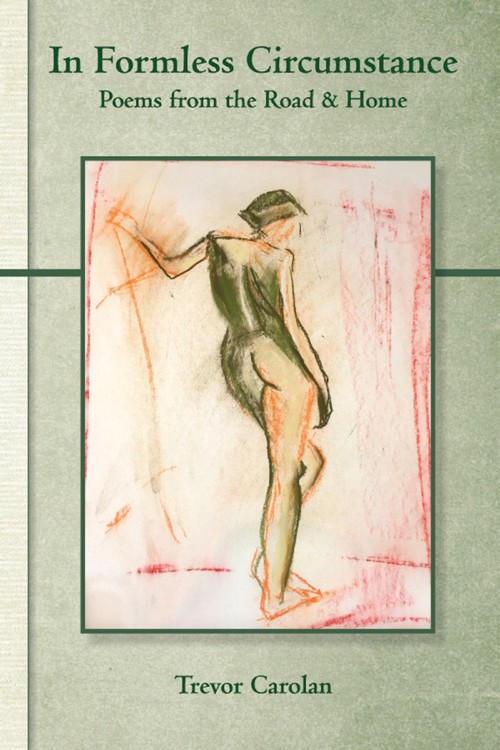In Formless Circumstance: Poems from the Road & Home by Trevor Carolan
In Formless Circumstance: Poems from the Road & Home
by Trevor Carolan
Ekstasis Editions, 2019; 84 pages, $19.95
review by Brian Palmu
At a time when one poetry collection after another presents a unifying cause or theme, it’s refreshing to be reminded of another mode, that of impressionistic observation and suffusion. Trevor Carolan’s In Formless Circumstance is such a volume, filled with palpable transfers of sound, taste, sight, touch, and smell.
Carolan is perhaps best known, in his poetry, for an interest in, and knowledge of, Asian thought, religion, and practise. Here, though, travels that provide the sensual geography are much more diverse. San Francisco, Banff, Hawaii, Ireland, Holland, France, Morocco, bengal, Australia, and back home in Greater Vancouver announce their separate flavours in dimensions both quiet and dominating. one is transported, in “Silage Time,” by “crakes call and swallows glide at dusk. / overhead, tidal shorelines shift in the clouds.” It’s no surprise Carolan, like wandering kindred spirit basho, selects a few haiku variations as a con- tainer for condensed, sharper impressions. Here’s “Vancouver blues”: “Quick! A blue-jay swiping / orange rinds off the compost-heap / in April rain.”
He also, at times, embeds his unpretentious lyricism within a larger narrative, usually one focusing on loss or commemoration. “Lime-stone” is one of the better efforts in this vein, wherein “big-horned ungulates move through jack-pine, / white on winter green,” and from which the author’s father would have “set to work with a chisel and skutch, // used a little heat to feather the cracks / and dance them apart.” “Dementia,” another commemoration, this one an impending elegy, is the collection’s penultimate entry. Bedside visits to a failing parent provide a rite of passage for many poets. The emotional scope of possibilities are vast and amplified, but so too are opportunities to crash on the rocks of maudlin banality. Carolan, here, navigates the shifting waves with a steady assurance, allowing details to undergird emotion and to actually do the heavy lifting. Life and death are contrasted from the outset: “[b]are winter branches; green salal on snow outside.” Weakness and strength set further contrasts: “[w]arm in the blanket we’ve wrapped her in, / she needs her rest,” which establishes an appropriately comforting dactylic rhythm, transitions, through the speaker’s reminiscence, to “that boxer’s wink you only see in the hard / pubs on Whetley Lane.”
There are a few clunkers in the mix. When Carolan favours abstractions, instead of framing the lyrical observations in a deeper context, those intangibles can lack clarity and edge, as in the beginning to “Marrakesh,” where “[s]trange dreams . . . / project subliminal fears / friends who’ve changed, / unexpected faces, the past.” In “Leggett”, the abstraction ends the poem, and the sound of frogs has to carry the enormous feat of “contemplating the global collective/ imagination.”
In Formless Circumstance continues the author’s concentration on impressions vividly recorded. My hope is that he writes more commemorative poems along the lines of “The Fallen Mason” or the aforementioned “Dementia.” Carolan isn’t afraid to mine plain yet deep emotion, and a narrative span of elegy or living appreciation would enrich his poetic opus.

